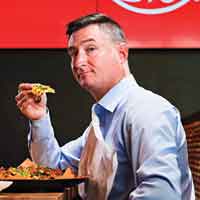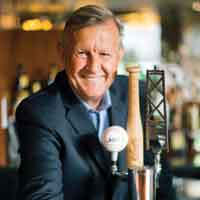A great leader creates and nurtures other leaders, possesses a clear vision, is courageous, has integrity, honesty, humility and clear focus. The following interviews with foodservice leaders whose companies made the Forbes Canada’s Best Employers List for 2018 showcase their thoughts on leadership qualities, industry challenges and the ways they continue to grow and develop their leadership skills. Here are a few of the highlights of what they had to say.

JORDAN HOLM
President, Boston Pizza International
Jordan Holm joined Boston Pizza 12 years ago and took on the role of president in 2017. A firm believer in leading by example, his career path includes positions in all aspects of the restaurant industry — from dishwashing and pizza delivery, to executive roles.
What are your strengths as a leader? If there is one element I learned in all the jobs I’ve had over the years, it’s the importance of communication. You need to have a clear vision of what you are trying to achieve and be consistent in communicating it throughout your organization.
What are some of the major challenges foodservice operators are facing today?
The industry today is much more hectic and people are much more critical than ever before. Guest expectations are changing very rapidly, whether it’s service methods, guest-facing technology solutions or culinary trends. The biggest challenge is trying to stay ahead of the rapid pace of change. Managing margins and labour costs is another.
How are you continuing to grow and develop as a leader? A lot of my personal growth comes on the job. I really enjoy problem solving with colleagues. Beyond that, I like to join peer groups to discuss the challenges facing our industry, as well as talk to front-line staff across Canada to understand floor-level challenges.
How do you keep employees motivated? It starts with listening and understanding what they’re looking for in their careers. We can then provide the right skills development to help them meet their career goals. Restaurant staff should have the opportunity to develop the way I did. We also encourage community engagement as a way to bring staff —corporate and franchisees — together to make a difference in people’s lives.
What advice would you give someone in a leadership role for the first time?
Find your own style of leadership that suits your personality and vision. As a leader, you need to know what works for you — and you have to feel comfortable and right when you do it.
 DALE WISHEWAN
DALE WISHEWAN
President and CEO, Booster Juice
Dale Wishewan’s career path has been an eclectic mix of engineering, sports and tech sales. He applied his diverse skills to an entirely new field when he founded Booster Juice in 1999, which has grown to 370 stores and counting.
How would you describe yourself as a leader?
I consider myself to be a very hands-on person. However, I don’t believe in micromanaging, but in encouraging others to have the comfort [level] to make decisions on their own. I used to work in tech sales and a big part of that was customer service. From those days, I learned the importance of finding the best way to communicate a vision with others.
What challenges are affecting the foodservice industry today? The biggest challenge, from my perspective, is how much the mobile world is changing our business. Also, there’s a different mentality with the current workforce entering the industry. As operators, we need to provide more freedom to people because they are more connected than they have ever been.
How do you develop and grow as a leader? I try to surround myself with individuals who have also grown big organizations, or are well respected in their communities. There are always good growth lessons to be learned. I also read books about successful managers. What is the most common mistake that leaders make? Not being adaptable enough to change. You always have to have your finger on the pulse of what’s happening around you so you don’t become stagnant and can stay relevant.
What is your biggest achievement? That I have hired many people in Canada and provided many opportunities for our franchise partners to grow personally and financially. When we started, the juice- and smoothie-bar category didn’t even exist in Canada. Just knowing we grew a new category here is a big achievement.

WARREN ERHART
President and CEO, White Spot Restaurants
This year, White Spot celebrated its 90th anniversary. Warren Erhart has been a big part of the iconic organization’s successful journey, having joined in 1990. Given its lengthy history, Erhart says the focus today is on remaining relevant through continuous improvement.
How would you describe your leadership style? It’s very much a servant-leadership approach. You need a certain type of humility to be in the service business. As a leader, my job is to serve first and act as a role model — and never ask for something I wouldn’t do first.
Who were your mentors? My mother always said whatever you do, leave things better than you found them. My father believed there’s no substitute for hard work. I apply that combination of thinking to what I do. On the business side, I would say George Tidball, who founded Keg Restaurants. He always talked about the guest experience and had a strong influence on my career growth.
What challenges are facing your sector today? I see two. One is the people side and the need to build, attract and retain great teams and individuals. The other big challenge is the speed of change, from technology to grocery stores turning into competitors. We’re facing incredible competition and changing needs from both the staff and guest points of view — we have to learn to adapt to that.
How do you motivate your employees? Personal development is critical for all of us, as people are always looking for ways to improve their resumés. I live by the philosophy of lifelong learning, so every year we try to look back to see what we did for ourselves and our peers in that area. It’s also important to keep a finger on the pulse of what different people are saying — from webinars to conversations. Sometimes I like to sit in on lunchroom discussions with millennials, which is a lesson in learning unto itself.
What legacy would you like to leave your company? I would like to look back at my life’s work here and believe it was worthwhile, that I enjoyed it and thatI made a difference.

AL JESSA
President, Joey Restaurant Group
Al Jessa has been a key player in the successful expansion of the organization, which now manages three brands and a total of 37 restaurants. Jessa believes an important aspect of leadership at Joey is creating a vision that’s bigger than where the company is right now.
What are the most valuable qualities you demonstrate as a leader? One is giving lots of space for people to communicate. At the same time, I give myself the freedom to say what has to be said. I don’t hide the tough issues and work on creating an environment where people don’t need to feel threatened. I also don’t ask anyone to do something that I wouldn’t do myself.
What is the biggest challenge facing leaders today? Getting the right talent. With so many great companies and great jobs, there’s a lot of choice for people out there. Today, they are picking us over them. When we interview people, they have researched our programs, the education we offer and our reputation —they know more about us than we do about them.
What are you most proud of? In 2005, we created a vision to reach the top of the industry and reorganized ourselves to accomplish every aspect of that by 2010. We did that. We have now created another future plan to become iconic in the hospitality industry. We’re not there yet, but are working on that, redoing everything around our
service, food programs and recruitment.
How do you motivate your employees? One thing we do every year is have everyone write down what they want to accomplish in their future career. As executives, we have to understand what it would take for them to realize that goal and provide the support they need.
What are you doing to ensure the future success of your organization? My goal is to transfer what has been done over the last 25 years to the future leadership. When I leave, I want to make sure I set up the building blocks for even bigger success. My attention is on transferring knowledge and growing the pipeline.

MO JESSA
President, Earls Restaurants
If you ask Mo Jessa what the most valuable qualities he demonstrates as a leader are, he would point to two things: his ability to communicate and a passion for the industry. Jessa has a long history in foodservice at all levels, having started as a dishwasher and prep cook 30 years ago.
What other strengths are important for you as a leader? Leaders need to have humility in order to learn that we don’t have all the answers. I’m the kind of leader who knows a company does best when its people accomplish more. So, my job is figuring out how my people can be better than me. The key to that is finding the best in them and unlocking it.
What is the biggest challenge facing leaders today? The pace of change. The entire industry is being disrupted in front of our eyes, so you have to accept that every day will be different. Keeping the status quo is the most dangerous place to be, because standing still equals death in the business now. Thinking about how to remain relevant is what keeps me up at night.
How are you continuing to grow and develop as a leader? I always challenge myself to learn, whether it’s reading books or talking to people out there that I need to know about. It’s also about letting go of assumptions and taking risks. We’ve done quite a few experiments that haven’t always worked, but experimentation builds resilience. You have to know how not to take failures personally and use them as a means to grow.
What advice would you give other leaders? The biggest challenge for any leader is not to be the star of the show, otherwise you diminish what others can do. If a leader can conquer that by giving credit where it’s due and providing opportunities for people to make mistakes without bringing them down, those people can then become great future leaders.
Story by Denise Deveau

















